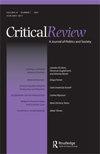Hegel’s Political Philosophy
IF 1.7
3区 社会学
Q4 POLITICAL SCIENCE
引用次数: 70
Abstract
ABSTRACT The Philosophy of Right presents us with a vision of bureaucratic paternalism that is designed to check the excesses of free markets set in motion by the triumph of natural-law thinking, which abstracted the principles of private property and subjective freedom from the institutions that had tamed them and situated them in a stable context. Against these excesses Hegel pits the agricultural estate, which has not succumbed to natural-law thinking; and a “universal estate” of bureaucrats who are educated in Hegel’s philosophy itself, freeing them of the natural-law conflation of human needs with arbitrary and endlessly expanding preferences. Taught by Hegel to look after the needs of the organic whole that is society rather than the gratification of their own preferences, the task of the bureaucrats of the universal estate is to curb the tendency of free markets to produce the social preconditions for an alienated “rabble” to bring down the system.黑格尔的政治哲学
摘要《权利哲学》为我们呈现了一种官僚家长主义的视野,旨在遏制自然法思维的胜利所引发的自由市场的过度行为,它将私有财产和主观自由的原则从驯服它们并将它们置于稳定环境中的制度中抽象出来。黑格尔对这些过度行为进行了抨击,认为农业产业并没有屈服于自然法思想;以及接受黑格尔哲学本身教育的官僚们的“普遍遗产”,使他们摆脱了将人类需求与武断且不断扩大的偏好混为一谈的自然法。在黑格尔的教导下,要照顾社会这个有机整体的需求,而不是满足他们自己的偏好,普世阶层官僚的任务是遏制自由市场的趋势,为异化的“乌合之众”制造社会先决条件,以推翻制度。
本文章由计算机程序翻译,如有差异,请以英文原文为准。
求助全文
约1分钟内获得全文
求助全文
来源期刊

Critical Review
POLITICAL SCIENCE-
CiteScore
1.30
自引率
12.50%
发文量
17
期刊介绍:
Critical Review: A Journal of Politics and Society is a political-science journal dedicated to advancing political theory with an epistemological bent. Recurrent questions discussed in our pages include: How can political actors know what they need to know to effect positive social change? What are the sources of political actors’ beliefs? Are these sources reliable? Critical Review is the only journal in which the ideational determinants of political behavior are investigated empirically as well as being assessed for their normative implications. Thus, while normative political theorists are the main contributors to Critical Review, we also publish scholarship on the realities of public opinion, the media, technocratic decision making, ideological reasoning, and other empirical phenomena.
 求助内容:
求助内容: 应助结果提醒方式:
应助结果提醒方式:


